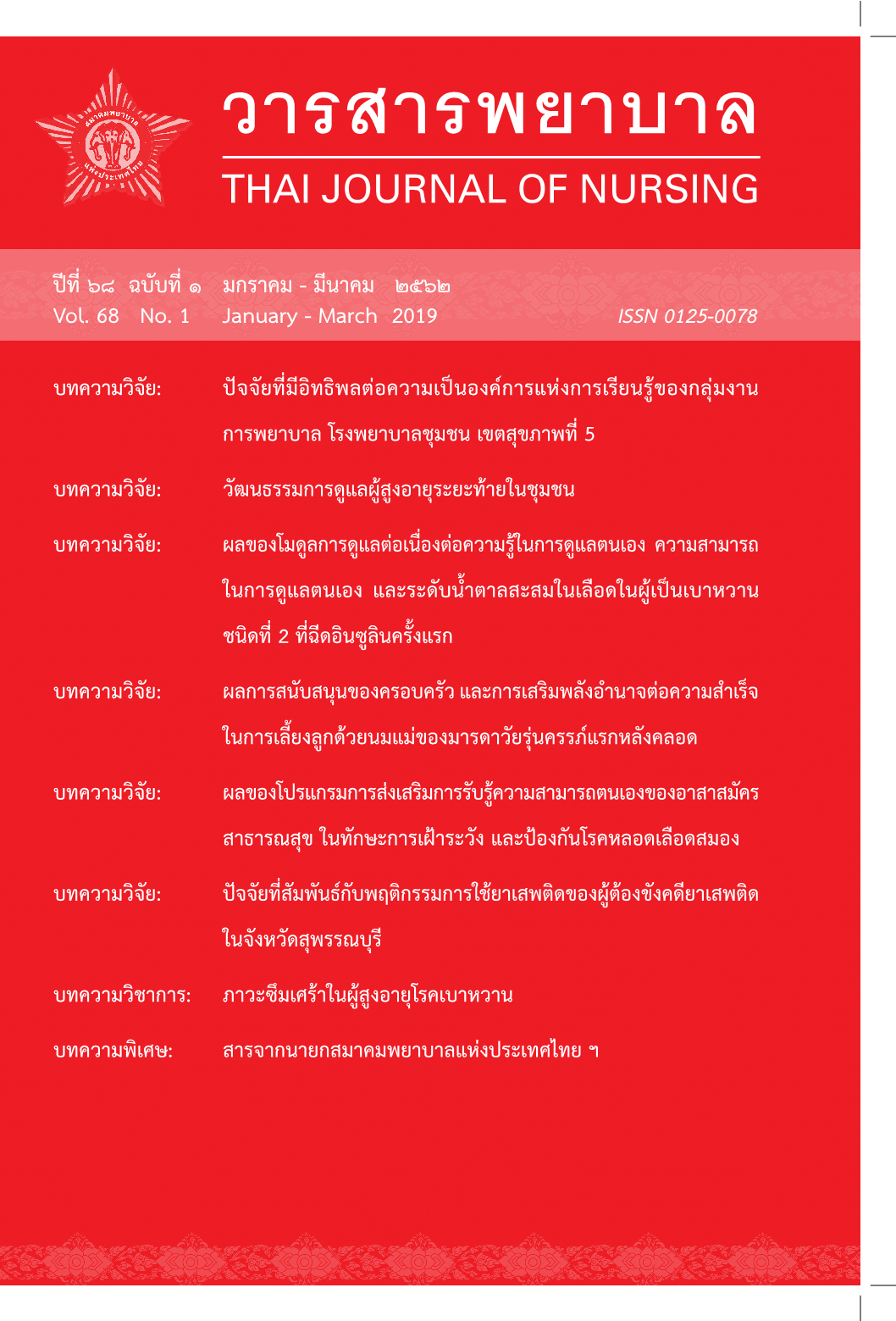Effects of a Continuing Care Module on self-care knowledge, self-care competence and HbA1C level in person with type II Diabetic Mellitus and the first insulin injection
Main Article Content
Abstract
This quasi-experimental research aims to investigate effects of a continuing care module (CCM)on self-care knowledge, self-care competence and HbA1C level in person with type II Diabetic Mellitus and the first insulin injection. A purposive sampling was used to select 64 diabetic person who received the first insulin injection at outpatient department, Chulalongkorn Memorial Hospital. The implementation was conducted during July, 2016 to August, 2017. The research tools consisted of a continuing care module, a knowledge test, a questionnaire on self-care competence for person with type II Diabetes. Data were analyzed for frequency, percent, mean, standard deviation and t-test. The findings were as follows. 1) After receiving the CCM, person with type II diabetes, had higher self-care knowledge and self-care competence than before receiving the CCM and decreased HbA1C level at p < .05. 2) After receiving the CCM, person with type II diabetes who received the CCM, had higher self-care knowledge and self-care competence than the comparative group at p < .05, but HbA1C level did not different from the comparative group at p > .05
Article Details
References
ดูแลตนเอง ระดับน้ำตาลในเลือดก่อนอาหารเช้า จำนวนครั้งของการเกิดภาวะน้ำตาลในเลือดต่ำ และคุณภาพชีวิตใน
ผู้ป่วยเบาหวานที่ไม่สามารถควบคุมได้ (วิทยานิพนธ์ปริญญามหาบัณฑิต ไม่ได้ตีพิมพ์). มหาวิทยาลัยรังสิต, ปทุมธานี.
จุฑามาส จันทร์ฉาย, มณีรัตน์ ธีระวิวัฒน์, และนิรัตน์ อิมามี. (2555). โปรแกรมการเรียนรู้เรื่องเบาหวานและ
การจัดการตนเองของผู้เป็นโรคเบาหวานชนิดที่สอง จังหวัดประจวบคีรีขันธ์. วารสารสาธารณสุข
มหาวิทยาลัยบูรพา, 7(2), 69-83.
ทัศนา บุญทอง. (2543). ปฏิรูประบบบริการพยาบาลที่สอดคล้องกับระบบบริการสุขภาพไทยที่พึงประสงค์
ในอนาคต. กรุงเทพมหานคร: ศิริยอดการพิมพ์.
นันนภัส พีระพฤฒิพงศ์, น้ำอ้อย ภักดีวงศ์, และอำภาพร นามวงศ์พรหม. (2555). ผลของโปรแกรมการ
จัดการดูแลตนเองต่อความรู้ กิจกรรมการดูแลตนเองและค่าฮีโมโกบินที่มีน้ำตาลเกาะในผู้ป่วย
เบาหวานชนิดที่ 2. วารสารสมาคมพยาบาลแห่งประเทศไทย ฯ สาขาภาคตะวันออกเฉียงเหนือ, 30(2),
98-104.
โรงพยาบาลจุฬาลงกรณ์ สภากาชาดไทย. (2557). สถิติจำนวนผู้ป่วยนอกโรคเบาหวานโรงพยาบาล
จุฬาลงกรณ์ ประจำปี 2557. กรุงเทพมหานคร: ผู้แต่ง.
วันเพ็ญ พิชิตพรชัย, และอุษาวดี อัศดรวิเศษ. (2546). การวางแผนจำหน่ายผู้ป่วย: แนวคิดและการ
ประยุกต์ใช้. กรุงเทพมหานคร: คณะพยาบาลศาสตร์ มหาวิทยาลัยมหิดล.
ศันสนีย์ กองสกุล. (2552). ผลของโปรแกรมการฝึกทักษะการจัดการตนเองต่อพฤติกรรมการจัดการตนเอง
ในการควบคุมโรคเบาหวานและระดับน้ำตาลในเลือดของผู้ที่เป็นเบาหวานชนิดที่ 2 (วิทยานิพนธ์
ปริญญามหาบัณฑิต ไม่ได้ตีพิมพ์). มหาวิทยาลัยธรรมศาสตร์, กรุงเทพมหานคร.
สมาคมโรคเบาหวานแห่งประเทศไทยฯ สยามบรมราชกุมารี, สมาคมต่อมไร้ท่อแห่งประเทศไทย, กรมการ
แพทย์ กระทรวงสาธารณสุข และสำนักงานหลักประกันสุขภาพแห่งชาติ. (2557). แนวทางเวชปฏิบัติ
สำหรับโรคเบาหวาน 2557 (พิมพ์ครั้งที่2). กรุงเทพมหานคร: อรุณการพิมพ์.
อุไรวรรณ สิงห์ยะเมือง. (2553). ผลของโปรแกรมพัฒนาความสามารถในการดูแลตนเองต่อระดับ
ฮีโมโกลบินที่มีน้ำตาลเกาะของผู้ป่วยเบาหวานชนิดที่2 (วิทยานิพนธ์ปริญญามหาบัณฑิต ไม่ได้
ตีพิมพ์). มหาวิทยาลัยมหาสารคาม, มหาสารคาม.
Keeratiyatawong, P., Hanucharurnkul, S., Boonchauy, W., Phumleng, B., & Muangkae, W. (2005).
Effectiveness of a support-educative program on diabetic control, perceived self-care efficacy,
and body mass index in person with type 2 Diabetes Mellitus. Thai Journal of Nursing Research,
9(1), 1-11.
Orem, D. (1991). Nursing: Concepts of practice. St. Louis: Mosby Year Book.


